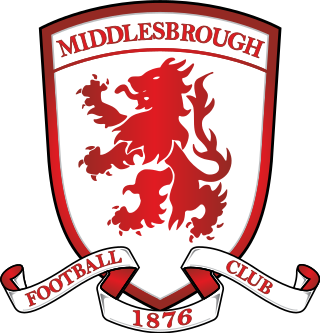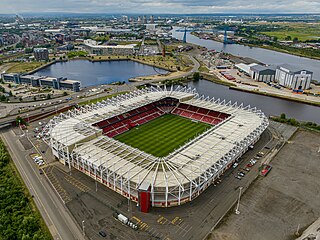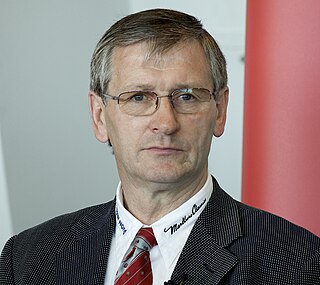Related Research Articles

Middlesbrough Football Club is a professional association football club based in Middlesbrough, North Yorkshire, England. The team competes in the EFL Championship, the second level of the English football league system. Nicknamed the Boro, they were formed in 1876 and are the 12th oldest football league club in England and Wales. The club have played at the Riverside Stadium since 1995, having previously played at Ayresome Park for 92 years, from 1903 to 1995.

The Riverside Stadium is a football stadium in Middlesbrough, England, which has been the home of Middlesbrough since opening in 1995. Its current capacity is 34,742, all seated, although provisional planning permission is in place to expand to 42,000 if required.

Bruce David Rioch is a football manager and former player for the Scotland national team. His last managerial post was at AaB in the Danish Superliga in 2008.
Peter Davenport is an English former professional footballer and manager who has managed teams in both the Welsh and English leagues. Born in Birkenhead, Cheshire, he won one full cap for England, against the Republic of Ireland in 1985. Most recently, he was assistant manager at Bradford Park Avenue.
Thomas Herbert McIntosh was secretary manager of Darlington, Middlesbrough and Everton
Bernard Joseph Slaven is a former professional football striker. He scored 223 goals in 567 league and cup appearances over the course of an 18-year career and also earned seven caps for the Republic of Ireland.

Ayresome Park was a football stadium in the Ayresome area of Middlesbrough, North Yorkshire, England. It was the home of Middlesbrough F.C. from its construction in time for the 1903–04 season, until the Riverside Stadium opened in 1995. It was demolished in 1997 and replaced with housing.
Alan Smith is an English former football manager, who has managed Dulwich Hamlet F.C., Crystal Palace and Wycombe Wanderers.
William Dixon Maddren was an English professional football player and manager. A one-club man, he made all his professional club appearances for Middlesbrough between 1968 and 1979, and went on to manage the club from 1984 to 1986.
Stephen Gibson is a British entrepreneur and the chairman and owner of Middlesbrough Football Club. In May 2020, he was listed 481st on the Sunday Times Rich List, with a net worth of £270 million.
Darren Wood is an English former footballer, who played as a full back in the Football League between 1981 and 1990 for Middlesbrough, Chelsea and Sheffield Wednesday.
Middlesbrough F.C. is a football club based in Middlesbrough, England.
Andy Walker was manager of English football team Middlesbrough F.C. from June 1910 to January 1911.
During the 1986–87 season, Middlesbrough participated in the Football League Third Division following their relegation the previous season. They were promoted back to the Second Division at the end of the season having finished second in the league.
Stan Cummins is an English former footballer, who played as an attacking midfielder or forward.
Gary Anthony Parkinson is an English former professional footballer who played as a right-back.
Paul Andrew Kerr is an English former footballer who played as a midfielder. He scored 48 goals in 264 league appearances in a 13-year career in the Football League.
The 1988 Football League Second Division play-off final was an association football match contested between Chelsea and Middlesbrough over two legs on 25 May 1988 and 28 May 1988. It was to determine which club would play the next season in the First Division, the top tier of English football. Chelsea had finished the season fourth from bottom in the First Division, while Middlesbrough were third in the Second Division. They were joined in the play-offs by the teams that had finished fourth and fifth in the Second Division: Chelsea defeated Blackburn Rovers in their play-off semi-final, while Middlesbrough beat Bradford City.
During the 1995–96 English football season, Middlesbrough F.C. competed in the FA Premier League.
This period in the history of Middlesbrough is considered its most traumatic. The club was in financial difficulties which eventually led to liquidation in 1986 and the near loss of professional football on Teesside. At the end of 1985–86 season Boro were relegated to the old Third Division. By then Willie Maddren was no longer manager. He was sacked with 13 games remaining, replaced by his assistant Bruce Rioch. Maddren is remembered for his astute signings. Bernie Slaven was signed from part-time football in Scotland to become a Middlesbrough legend. Maddren also brought youth team players through the ranks, including Colin Cooper and Stuart Ripley.
References
- "Like A Phoenix From The Flame". boroforecast.com. Archived from the original on 28 March 2007. Retrieved 21 May 2007.
- Glasper, Harry (1989). Middlesbrough A Complete Record 1876–1989. Breedon Books Sport. ISBN 0-907969-53-4.